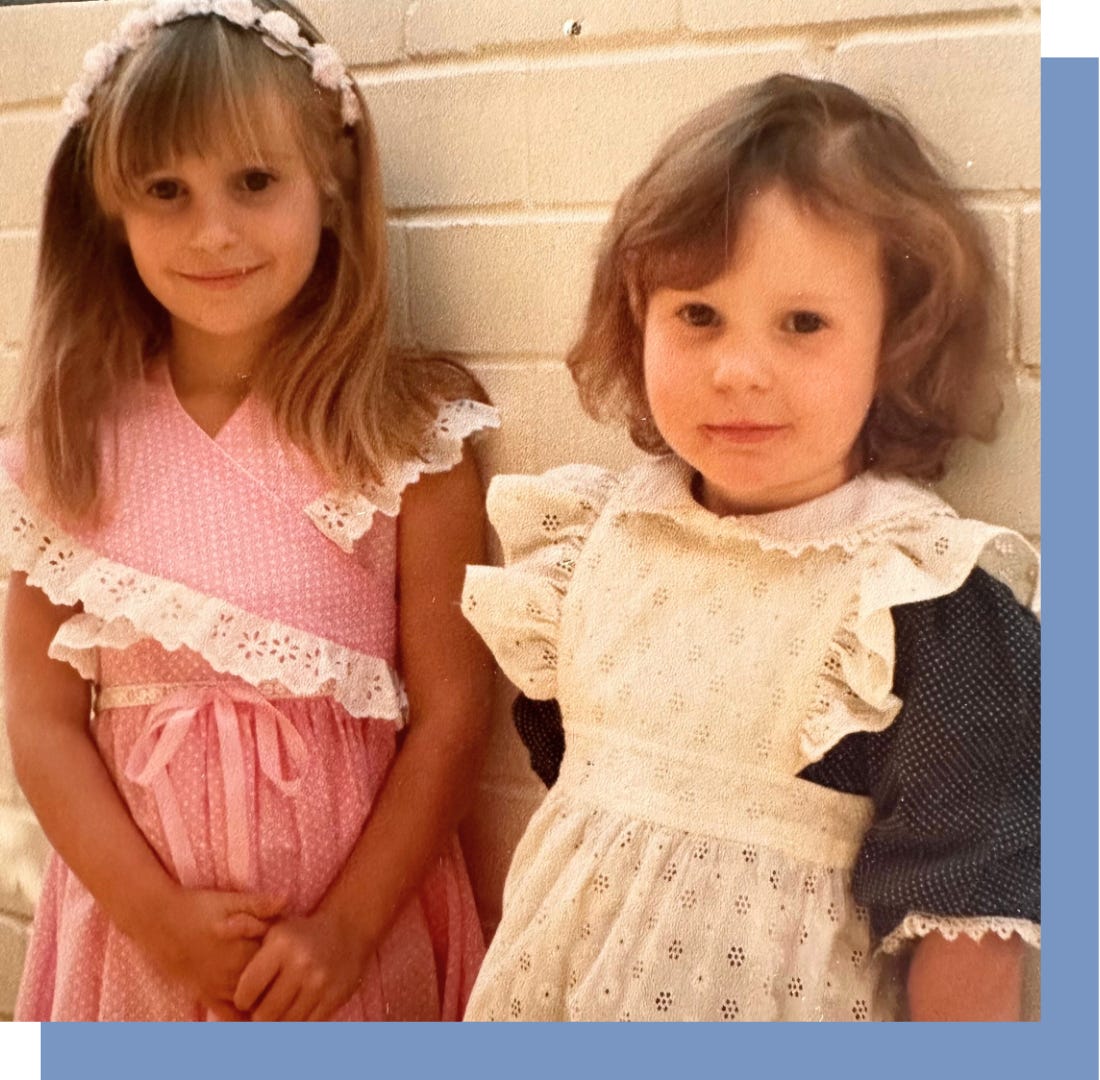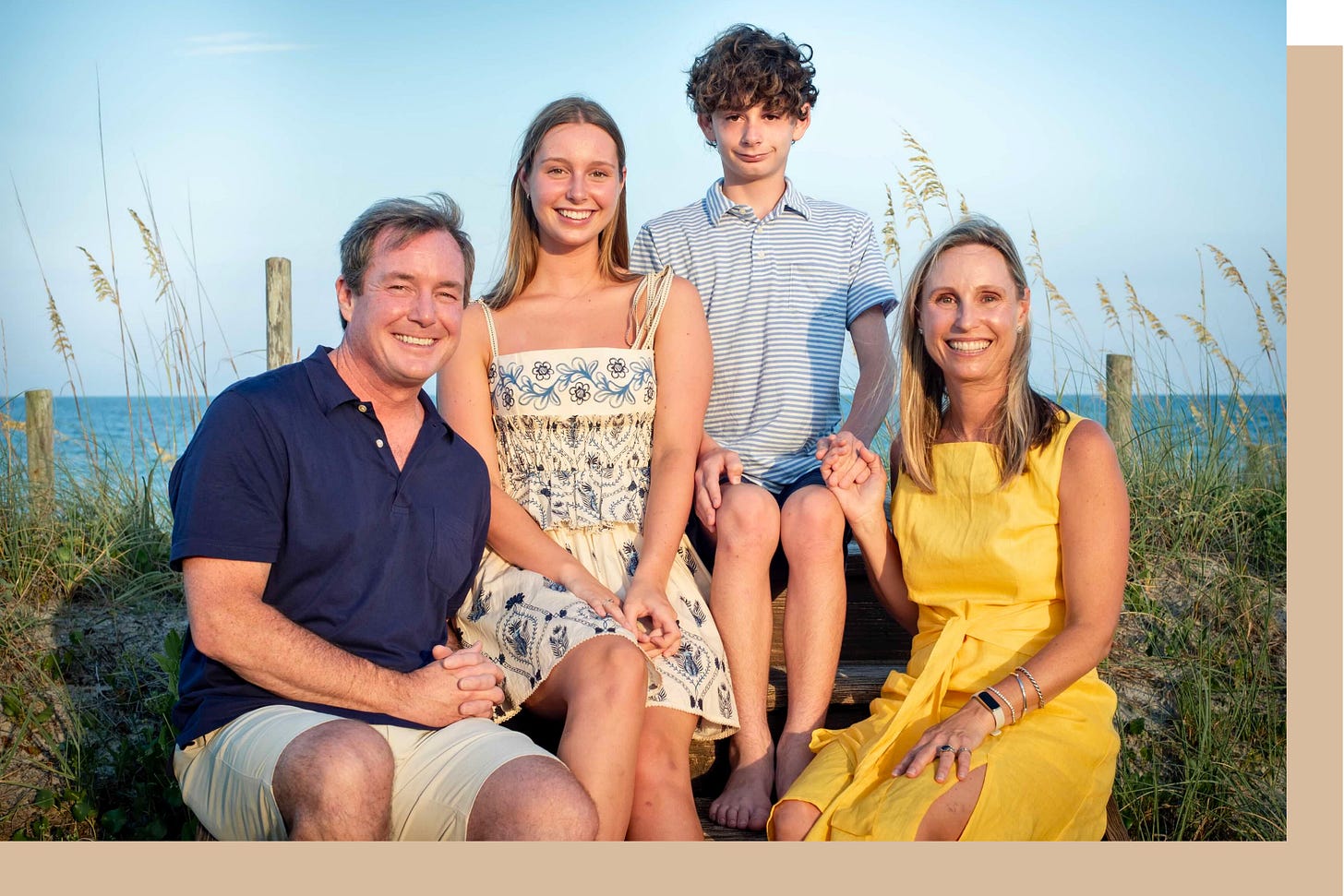

For months, I’ve been obsessively following Ina Garten’s press interviews about her new memoir, Be Ready When the Luck Happens.
Like her, my early years were dominated by violence and emotional abuse, and as I read the paragraph below in an interview, I felt a satisfying click inside my mind, like a safe unlocking:
“Even the most amateur psychologist could put it together. Ms. Garten has dedicated her career to creating a paragon of domestic warmth that is precisely what her childhood wasn’t. She conjured a welcoming place where no one turns down an invitation and everyone has fun.”
“Oh!” I thought, “This is why I think and write about happiness.” My childhood made me an expert on unhappiness, and I’m driven to create a life and family that’s precisely what my childhood wasn’t.
For a long time, I didn’t tell anyone what went on in my parents’ house. I knew something was wrong, but I wanted to be a “good girl” and earn my parents’ approval by staying silent. My parents were contemptuous toward each other and had few friends. My father was a workaholic who beat my sister and me with his leather belt as punishment and with his fists when he lost his temper. The atmosphere was fraught, always on the verge of chaos and crisis.
I furtively read the stories about “battered wives” that proliferated in women’s magazines in the 1980s, gripped because I knew how those women felt: trapped, financially and physically, afraid that if they told anyone about the violence, it would escalate.
My mother’s suicide threats left me anxiously monitoring her moods, terrified she would die on my watch. She was obsessed with the idea that “everyone always abandoned her” and channeled that fear into controlling my sister and me, manipulating us, and undermining our confidence so we would not leave her. “No one will ever want to live with you,” she told me. “If people really knew you, they’d never want to be friends with you or marry you.”
Amidst this dysfunction, my sister developed a debilitating mental illness in her senior year of high school.
To tune out the sound of my parents arguing, I read voraciously and constantly: at every meal, in the car on the way to and from school, and in bed late at night. To counteract the sense that everything was out of control, I spent hours in my bedroom, naming and numbering my books and organizing them on shelves. Later, a manager would note that my special skill was “bringing order to chaos.”
I bolstered myself by sticking motivational mantras on my bedroom walls; my favorite was: “God will never give you more than you can handle,” a common misquote of Corinthians 10:13. I developed a ritual of mentally reciting a list of compliments from teachers and others: I am a good reader, I have straight hair, I am a fast runner, I have a nice smile.
As a teenager, I decided my purpose in life would be to make things better after I discovered the meaning of ameliorate, the root of my name. I became an aficionado of self-help books, beginning with The Road Less Traveled, which I mostly found confusing, but it comforted me with the idea that my mind could control my emotions. I wanted to be part of a happy, loving family and I fantasized about group therapy sessions where my parents would tearfully apologize to each other and my sister and me, and we’d all become completely different people.
But by my late 30s, I realized I would never solve problems caused by generational trauma and mental illness, so I devoted myself to the one thing I could improve: my life. Unlike Ina Garten, who chose not to have children in reaction to her upbringing, I wanted to get married and have kids and create the warm, happy family life I yearned for.
I thought it would be easy: I would simply do the opposite of everything my parents did.
Reader, it was not that easy (it’s never that easy), but growing up in an unhappy home taught me a lot.
Here are five of the most important things I know about raising a family in a supportive atmosphere of warmth and love:
Respect is the cornerstone of healthy relationships. When my parents said cruel things to each other in front of my sister and me, I felt unsafe because the foundation of our family—their relationship—seemed unstable. I knew that if I wanted a happy family, I would need to marry someone I loved, but more importantly, someone whom I respected and admired. As I would learn after having children, raising a family is like running a small, 24-7 business, and parents who work well as a team are key.
My parents were locked in an unhealthy cycle, exhibiting what marriage expert John Gottman calls the Four Horsemen of communication styles: criticism, contempt, defensiveness, and stonewalling. I wished my parents would divorce so they could both find happiness. This aligns with Gottman’s research. He has found that of the Four Horsemen, contempt is the number one predictor of divorce and that the antidote is building a culture of fondness and admiration.
Put on your emotional oxygen mask first. Kids are sponges who absorb their parents’ feelings, and when adults are struggling with anxiety, stress, and depression, children feel it, too. As a parent, getting professional help—and being open with children and teenagers about how to deal with negative emotions—is important for teaching them how to cope with the inevitable difficulties of life.
I have benefited enormously from individual and couples therapy, and I know my parents would have too, but in the ’80s and ’90s, therapy and anti-anxiety and depression medications were not as acceptable or as accessible as they are now.
Be honest and open. Often, as a parent, there is a temptation to shield children from what we consider “adult” issues, but children handle the truth when appropriately shared, much better than an atmosphere of secrets and lies.
My sister and I were kept in the dark about many things, and it led to a sense of confusion and the underlying question: is the world really as it seems? We didn’t trust our parents to tell us the truth about difficult issues, and consequently, we didn’t confide in them or go to them for help when we needed it.
I resolved to make honesty a priority with my children, from using the correct words for body parts when they were little to being open about my experiences with drugs and alcohol and explaining the circumstances surrounding my son’s adoption. Being open with kids lets them know that hiding things (and lying) is unnecessary, and if they’re in trouble or need advice, no matter how sensitive the issue, they can talk to us.
Unconditional love is the key. My parents were unable to love my sister and me without attaching rules and conditions, and their inflexible insistence on compliance eventually led to both of us cutting off contact with them. My mother’s fear of abandonment led to harsh punishments when we left home (me at 19, my sister at 36), including a decade-long lawsuit against my sister.
Loving kids unconditionally includes allowing them to freely express how they feel and what they want, but, as I’ve learned as my children have grown, this is not always easy, and I lean heavily on the skills I learned through the indispensable parenting guide “How To Talk So Kids Will Listen and Listen So Kids Will Talk.”
A simple but powerful piece of advice I love is from
of the blog Cup of Jo, who, when she’s worried about whether she’s doing parenting right, asks herself: "Do my children feel loved?"Another guide is Brené Brown’s “Wholehearted Parenting Manifesto” which begins with, “Above all else, I want you to know that you are loved and lovable” and ends with, “I will not teach or love or show you anything perfectly, but I will let you see me, and I will always hold sacred the gift of seeing you. Truly, Deeply, Seeing You. ”
Independence is the main goal. My mother practiced an extreme form of helicopter parenting, from choosing my high school classes and college degree, to restricting my social life: I was not allowed to sleep over at friends’ homes or attend parties and could only watch one hour of supervised television per week.
While I believe she was doing her best to keep me safe and help me be “successful,” this led to the sense that I could not trust myself to make decisions or know what I wanted and that hewing to strict rules (approved by an authority figure) was the “right” way to live. I developed the habit of keeping my desires secret because I didn’t want to be ridiculed or told I couldn’t have what I wanted.
It’s now well understood that overparenting is harmful. People ultimately build successful and satisfying lives by following their passions and interests (whether they are judged as likely to “lead to success” or not) and through healthy relationships.
This year, my husband, Jim, and I will celebrate our 19th wedding anniversary, and our children are now 18 and nearly 14. We’ve worked hard together to create the stable, warm, and supportive family life I dreamed of. It’s bittersweet. There are times—birthdays and Christmas especially—when I fantasize about how things could still change with my parents and sister.
And while the family I’ve created with Jim is an ongoing work in progress, these days, I also pursue my mission to “make things better” by writing about practical happiness strategies and advice for living a more satisfying, joy-filled (and fun) life.
Thank you for reading this very personal piece. ❤️ We’re all products of our childhoods, and I’m curious as to how your early years impacted your decision to have children or not—and if you are a parent, how do you do it similarly or differently to the way you were raised? I’m always learning!
You may also like…
Clicking the ❤️ button at the top or bottom of this email supports my work! ❤️
🔔 Subscribe for practical advice and inspiration to infuse more joy, delight, and fun into your life, plus culture and entertainment recommendations to make the most of your leisure time!
VIP subscribers receive the gift e-book, 28 Books That Will Change Your Life, exclusive subscriber-only content, plus other fun goodies!









Amelia, I'm absolutely blown away—by learning about this incredibly tough part of your life, yes, but also by the nuanced and forthright way you've told this part of your story.
I can't imagine it was easy to write or share (though I do hope it was cathartic!), but as a reader and friend, I now have a much deeper understanding of why your exploration of happiness in these pages has always felt *so* incredibly heartfelt.
Thank you for publishing this! ❤️
Wow - I relate to this so very much. I had a not-great childhood and when I became a mom last year, I went (and am still) going through so many different emotions. It's oddly healing, but definitely still hard work. Many times I feel like I'm not only learning how to parent my daughter, but how to reparent myself. I started therapy this summer and that's helped. Writing like yours helps too. :)
A song I've really resonated with is The Tree by Maren Morris. She sings "I'm done filling a cup with a hole at the bottom, I'm taking an axe to the tree" and I love thinking of that lyric when I think about me ending generational patterns. The chorus then goes on to sing "Do you hear that? A heart letting go of the weight it's been holding." Lovely + liberating! Give it a listen if you haven't heard!
Thanks so much for sharing your story!